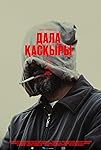Eye For Film >> Movies >> Steppenwolf (2024) Film Review
Steppenwolf
Reviewed by: Jennie Kermode

Stumbling into shot, a bruise on her cheek, a blank look on her face, Tamara (Anna Starchenko) doesn’t look like a protagonist – more like a poor helpless victim of violence whose destiny, if she has one, is to be rescued by somebody else. Her hands are constantly raised in front of her body, moving as if in remembered self defence; she doesn’t seem fully aware of her surroundings. We never learn exactly what has happened to her, though her clean hair and neat dress suggest that it was recent. Something more immediately overwhelming and destructive even than the disappearance of her son. She stutters when she speaks his name, but it’s one of few words that come to her. “Timka. Must find Timka.”
We will stay with this damaged woman throughout the film, and although she barely recovers, we will come to recognise her agency nonetheless. She has her own quiet kind of strength. Though she can barely function, she will keep on going, no matter how hard tough it gets, to save her boy.
Adilkhan Yerzhanov’s blistering modern western, which screened at Fantasia 2024 and is also part of the Edinburgh line-up, is set in the badlands of Kazakhstan, where the rule of law is minimal and criminal gangs battle one another for control of goods and territory. Brajyuk (Berik Aitzhanov) is a police officer, an interrogations expert – or, to put it more explicitly, a torturer. Having long ago given up on any real hope of justice, he spends his days dispensing violence instead. When Tamara staggers into the police station seeking his help, she is initially a convenient means to get out of a dangerous situation. When he realises who has taken the boy, however, the quest to find him becomes personal.
There is a good deal of brutality on display here, and all of it presented in a matter-of-fact way, obliging viewers to accept it for what it is. over time, we will learn a few things about how Brajyuk came to be this way, though Yerzhanov does not ask us to feel sympathy for him, and he appears to have little for himself. He often becomes frustrated with Tamara, at times trying to provoke her into showing more signs of life. He shouts abuse at her and sometimes hits her, but as he gets used to her limitations, he accepts them for what they are. A sort of trust develops between them, more meaningful in the complete absence of any sexual or romantic chemistry. One gets the impression that it is her blankness that enables him to start opening up. On the one occasion that she refuses to do as he says, he respects that too.
The storyline is fairly simple. It speaks to far too many real world horrors, recent or ongoing. The setting gives it additional complexity, moving from what, aside from the particular type of weapons and uniforms, could be a frontier town any time in the past five centuries, to a fortified stronghold which recalls post-apocalypse cinema, and on again to a wide open land where people living in yurts sing ancient songs and finance their continued cultural survival by engaging in the worst of modern evils. Palls of smoke give way to vast white skies and then to a darkness beyond the limits of civilisation. The swirling synths of Galymzhan Moldanazar’s score seem to strain towards modernity, with roots in the deep past.
Although Aitzhanov is very capable, we’ve seen characters like his before, hiding behind violence and sardonic humour, elegant in their viciousness. Tamara, however, is something else. Starchenko is extraordinary in her ability to develop an emotionally complex character despite the state of shock that covers everything. There’s a fully developed character arc here which stands in opposition to society’s tendency to write such women off, to see them as beyond any hope of recovery and therefore as less than human. She’s a fascinating choice of heroine, and through her Yerzhanov is able to envisage, however bleakly, a world beyond conflict, in which life matters for its own sake.
Reviewed on: 12 Aug 2024
















